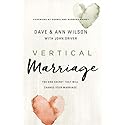Like most young couples on their wedding day, we were starry-eyed lovers who had not a care in the world. Elated to begin our life together, we had no doubt that the days ahead would consist of happy, beautiful, matrimonial bliss. After all, we both loved Jesus, and we were confident that God had brought us together as husband and wife.
What could go wrong?
It may not be easy to admit, but the unfortunate truth is that our wedding day was the first day of the worst year of our lives. We were like two trucks on a highway both driving blind with no headlights—and we were about to experience a traumatic head-on collision at the ever-dangerous speed of life. No seatbelts. No airbags.
We had no clue what was about to hit us.
Although it’s difficult to boil our issues down to just one problem, it seems pretty evident that the most urgent issue was that we hardly knew each other. Well, perhaps the one even more urgent than that was that we hardly knew ourselves. How are you supposed to get to know someone else in such an intimate and intrusive environment when you have yet to fully discover your own worth and identity? Our idyllic pleasure cruise brought with it a cargo of powder kegs stowed away deep under the main deck, just waiting to go boom.
Needless to say, we found ourselves in constant conflict, which generally led to lots of shouting and screaming at each other. Up to that point, no one had ever prepared us for the conflict that inevitably occurs in any close relationship, much less in the closest of all relationships. We thought it odd to be at odds, which stacked the odds against us.
But it doesn’t have to be that way for you. Having the appropriate expectations and tools for resolving conflict in marriage can defuse the bombs below deck in your marriage. —
Four Patterns of Conflict Resolution
One of the first things we learned (the hard way) about conflict resolution is that all of us approach it with different patterns or styles. We often copy what we witnessed in our homes as children. We may also function out of beliefs that we subconsciously hold regarding conflict. There are four basic patterns of conflict resolution in which we all fall.
WIN. A winner is usually good at conflict. Winners actually like conflict and are skilled at winning the argument. They bring eyewitness accounts and evidence, complete with full-color pictures, proving they are right. This is an exaggeration, but only slightly.
YIELD. A yielder will “give in” to bring harmony to the relationship. Yielders believe that the marriage is more important than this one, isolated conflict, so they yield to bring peace back to the marriage.
WITHDRAW. A withdrawer hates conflict. Withdrawers will do whatever it takes to stay away from conflict. If they can leave the room, consider them gone. But if leaving is not possible, they will shut down emotionally instead. It is very difficult to get them to even engage in the conflict.
RESOLVE. A resolver will do whatever it takes to arrive at a resolution. Resolvers can’t stand to live life without their conflicts being resolved. It takes a lot of work, but they will roll up their sleeves and get it done in whatever way possible.
Can you guess what patterns we brought into our marriage? Ann was a winner. She grew up in a home where conflict was dealt with quickly and regularly. Her parents and siblings just “put it out there” and handled conflicts as they arose. She likes a good fight.
Dave, on the other hand, grew up in a home where conflicts got loud and ugly. Usually, there was alcohol involved, and those fights eventually ended in an ugly divorce. This led him to believe that all conflicts are bad and should be avoided at all costs.
So we walked into our marriage having no idea that a winner and a withdrawer were now required to handle conflict together in a healthy, God-honoring way. Good luck with that!
Removing the Blinders
In only a few short months, we had gone from gazing lovingly into each other’s eyes to glaring at each other with anger and disgust, each wondering—and often not only to ourselves—if we had married the wrong person.
It may not happen to every couple so quickly, but at some point in marriage, the blinders are removed from your eyes and you begin to realize that this person you have married is not just slightly flawed, but is actually full of flaws.
This is why we have literally had hundreds of couples tell us that they believe they married the wrong person—at some point, it happens to almost all of us.
Every Marriage Couple Will Have Conflict
The fact is that every married couple will have conflict—and perhaps a lot of it. That has certainly been true for us. We are both stubborn, willful, selfish people. There are situations in which one spouse possesses strong personality traits, while the other tends to be more docile or passive. In these situations, it may take longer for the “fuse” to ignite the powder keg, because a pattern has been established of one spouse dominating the other in moments of conflict, but the person being dominated is complicit in the whole affair because such is their default setting when it comes to matters of conflict. But make no mistake, even in situations such as these, a lack of healthy boundaries agreed on by both spouses will eventually cause the fuse to reach the gunpowder, even if it takes years. And then . . .
Boom!
In our marriage, we’ve learned the hard way that how we handle conflict will determine the health and future of our marriage.Click To TweetIt is only by the intervention of a gracious God that we didn’t give up on our marriage during that terrible first year. We entered marriage woefully unprepared, but we slowly learned how to handle our emotions, how to confront one another in more loving and constructive ways, how to forgive, and, most importantly, how to trust God—even in those ugly moments when there weren’t enough “bleeps” to go around. If we had not allowed God to speak to us through the Scriptures and through his people, we don’t know where we would be today.
Adapted from Vertical Marriage by Dave and Ann Wilson. Copyright © 2019 by Dave and Ann Wilson. Used by permission of Zondervan.












